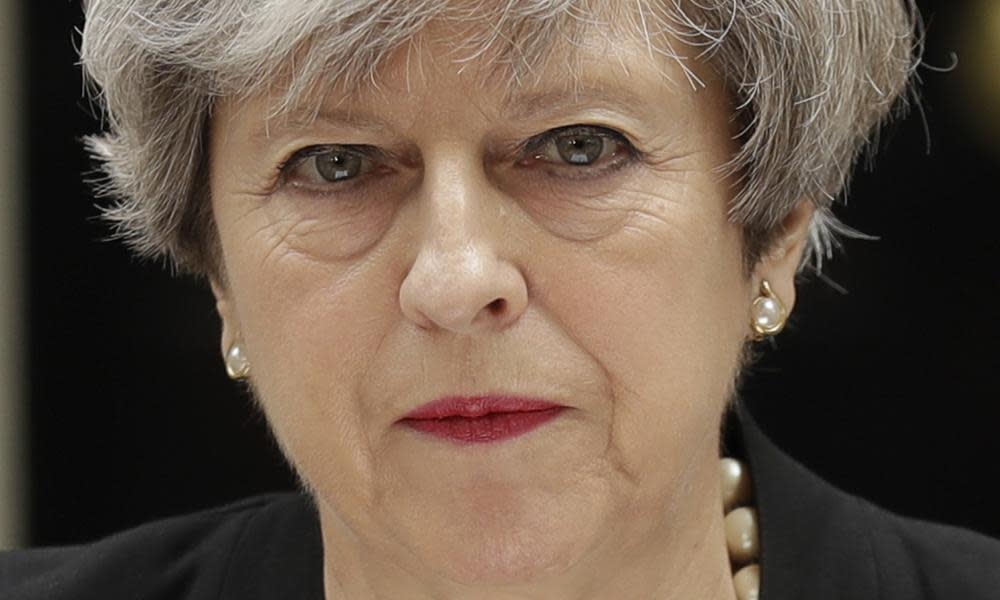The Guardian view on the resumed election campaign: there’s a message in the poll wobble | Editorial

It is never wise for political parties to take votes for granted. This is a mistake that can be made over the long term, as Labour learned in Scotland, presuming a tribal allegiance that decayed. And it is a mistake that can be made over the short period of an election race – as the Conservatives risk doing with a campaign based on little more than the assertion of Theresa May’s entitlement to be prime minister.
The Tory strategy was predicated on polls giving Mrs May a vast margin of trust over her Labour rival on vital issues, notably the economy and national security. The Conservative leader appears to have decided that there was no need even to engage with Jeremy Corbyn’s policies and opinions.
By contrast, the Labour campaign has been built around ideas and argument. Mr Corbyn’s speech today, marking the resumption of election competition after three days of truce, advanced a challenging proposition about foreign policy and domestic terrorism. It argued that western military interventions have fomented grievances that are exploited by radical jihadis when recruiting for terrorist attacks. This can sound, in crude summary, like an allegation that Britain has invited atrocity upon itself.
The Labour leader’s decision to stride into such fraught territory might be seen as brave, irresponsible or foolish. The tenor of response depends on receptiveness to the argument. But clearly the argument is one worth having – not least because it is advanced by a man who wants to run British foreign policy. To dismiss his view as a function of deficient patriotism is a poor substitute for rigorous rebuttal.
Rebuttals are available. Mr Corbyn’s approach is selective about the jihadi narratives it takes seriously. It implies there was an alternative path where British soldiers were not involved in wars abroad and so the country was less vulnerable to attack. But radical Islamists do not discriminate carefully between intervening nations and others; nor do they offer coherent political objectives as the basis for peaceable compromise. They pledge destruction of western and all “infidel” lives as an end in itself.
It should be possible to hold two ideas in parallel: one is that ill-executed foreign policy has failed to bring the security dividend that was promised. The other is that criticism of western policy is inadequate as an explanation for the rise of violent jihadism.
The Labour leader has half of a thesis about Britain’s security. Mrs May’s counter-proposition is hardly more sophisticated. She asks to be allowed to get on with the job of keeping the country safe without interrogation of the strategy or philosophy that underpin her decisions. The fact of being Theresa May is meant to be sufficient.
This is a pattern that extends across the spectrum of election issues. The Labour party published a detailed manifesto, full of retail policies and, alongside it, a document setting out hypothetical costings. The viability of their ideas might be open to debate and their arithmetic can be questioned – as indeed it was by the Institute for Fiscal Studies (IFS) . Mr Corbyn’s prospectus may be incomplete but at least it is constructed to resemble a practical agenda for government.
The Conservatives published a manifesto consisting mostly of vague aspirations and no costings at all. Their most detailed proposal, a measure to recoup social care costs from property assets, was abandoned within a week of its launch. A policy on free school breakfasts looks similarly wobbly, since the suggested funding is manifestly inadequate. The IFS struggled to find enough arithmetic in the Tory manifesto to analyse.
The contrast between the two approaches reflects a level of confidence on the Tory side that risks tipping into complacency. The problem here is the conviction that policy is a non-essential part of the election offer because the character of Mrs May and her commitment to Brexit are the essential offer. A discernible narrowing in the opinion polls suggests many voters expect to be courted with something more.
Mrs May’s supremacy at the start of the campaign will not be easily overturned. Polling volatility should not be over-interpreted. But the palpable sense of a Tory wobble is a warning to the prime minister. She presumes her credentials to do the top job speak for themselves. But she does not have a long record of achievement to justify that confidence. The Tories have gambled everything on the effectiveness of their messenger. They need a more substantial message.

 Yahoo News
Yahoo News 
